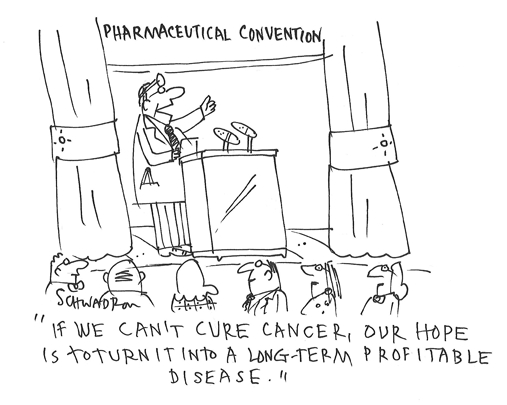Why do hospitals continue to serve foods that cause disease? If a hospital’s number one concern is to save lives and help people heal, then animal products should be off the menu.
I recently clicked on the website for one of the top cancer hospitals in the world, Memorial Sloan Kettering Cancer Center (MSKCC), and I was greeted with the following headline that sat just under the MSKCC logo:
“Leading the fight against cancer. Always focused on you.” I almost spit out my drink.
Really?
Before I continue, let me share my experience with Memorial Sloan Kettering Cancer Center.
A few years ago, a member of my family was treated at Memorial Sloan Kettering Cancer Center (MSKCC), and we were humbled, and even moved by the level of compassion and care that we received from a few of the nurses, as well as at least one or two of the doctors. Having said that, I was appalled by the countless cancer causing food options that MSKCC provides to both its patients and visitors. It was also quite a sight to see first hand the doctors and staff of one of the top cancer hospitals in the world (MSKCC), prescribe, and even excitedly encourage their patients to consume the very same animal based food products that cause cancer in the first place. One evening while I was visiting, a doctor came into our room and asked in an animated way, why a nearby patient wasn’t eating her ice cream. The roommate, who was older and being treated for ovarian cancer for the 2nd time, immediately sat up and gobbled down her ice cream as per her doctor’s orders. A day or two later, after the ice cream incident, I asked another oncologist about what role nutrition played in the treatment and healing process at MSKCC. She seemed surprised by the question, and responded by saying that she “wasn’t too concerned about what her patients ate, so long as they just ate.” Although the doctor seemed nice, I immediately imagined how many patients she had given this harmful/horrible advice to over the years regarding nutrition. I know too from my own family members, that a lot of people will likely not question a doctor on these matters as they may very well look up to the doctor as an all knowing, authority figure (which is even more frightening when we consider that most medical doctors don’t know anything about nutrition).
Anyway, here is a list of some of the animal based food offerings from the room service menu at Memorial Sloan Kettering Cancer Center (I have pictures below too, as these foods were also fed to hospital visitors in the cafeteria):
“Memorial Sloan Kettering – Room Service – A Bouquet of Fine Foods – Regular Menu”
Milk (Cow’s milk): Regular, 2%, and Chocolate
Notes: According to Dr. T. Colin Campbell, “Casein [the main protein of cow’s milk] is the most relevant chemical carcinogen ever identified…Casein, which makes up 87% of cow’s milk protein, promoted all stages of the cancer process. What type of protein did not promote cancer, even at high levels of intake? The safe proteins were from plants, including wheat and soy.”
Also, chocolate milk has about as much sugar as a can of soda. In addition, the sugar is likely from conventionally grown corn or beets (cheaper than cane), and as a result, may be genetically modified and have traces of glyphosate (which is a carcinogenic biocide).
Two different Fish dishes, and multiple Chicken dish options or Chicken as a topping
Notes: Animal factory chicken means that in addition to the cancer causing animal protein, cholesterol and saturated fat, the patient/visitor will also be consuming antibiotic and hormone residues, as well as high amounts of sodium, etc.
Slow roasted Beef Ribs.
Notes: According to Dr. Michael Greger, “Two major Harvard studies, the Nurses’ Health Study, which followed about 120,000 30- 55-year-old women, and the Health Professionals Follow-Up Study, which followed about 50,000 men aged 40 to 75, found that consumption of processed and unprocessed red meat appeared to be associated with an increased risk of dying from cancer and heart disease, as well as shortened life spans overall”.
Salads with all kinds of Cheese (cow’s milk) topping options, as well as Chicken as a topping.
Cheese (cow’s milk) pizza, Grilled Cheese (cow’s milk) sandwiches, Beef Burgers, and French Fries (hydrogenated oils).
Roast Beef, Ham, Tuna and Egg salad sandwiches
Notes: Do I really need to continue? 🙂
Desserts: Ice cream (cow’s milk again that is flavored with chocolate or vanilla), pudding, and Gelatin (animal ingredient).
A bouquet of fine foods? Really? A bouquet of fine poisons is more like it. In addition to their complete horror show of a menu for patients and visitors, MSKCC also uses a product called Crystal Light which is offered as a sweetener for the contrast fluid for their CT Scans. Some of Crystal Light’s ingredients include Yellow 5, Red 40, and other artificial colorings that may be linked with cancer. Another ingredient, Aspartame, has also been associated with triggering or worsening various chronic illnesses such as brain tumors, Alzheimer’s, lymphoma, etc. In addition, corn syrup is used in many of these products as well, and although independent research is limited, 90-95% of the corn grown in the United States is genetically modified, and will likely contain glyphosate residue (according to the World Health Organization, glyphosate is a “probable human carcinogen”).
Memorial Sloan Kettering Cancer Center is a “nonprofit” hospital, and it is almost as if the decision makers at MSKCC want their patients and visitors to get sick, remain sick, or worse. Seriously.
According to Dr. Dean Ornish, “The only diet that has been scientifically proven to reverse heart disease, to slow, stop, or reverse early-stage prostate cancer, and to reverse aging by lengthening telomeres (among other benefits) is a whole-food plant-based diet low in both fat and refined carbohydrates.”
So, what gives? If the data is overwhelming that proves that plant based diets can prevent, effectively treat, and even reverse cancer, why are hospitals like MSKCC (and other so-called health organizations) still serving cancer causing animal products to their patients and guests?
As is too often the case, just follow the money.
Knowing what I know about capitalism, I thought that I should start at the top, and sure enough, I didn’t have to look too far for answers. Even though MSKCC is listed as a “non-profit” hospital, its CEO and president of many years, Dr. Craig B. Thompson makes a cool $4 million per year (he is no doubt making even more today as the $4 million figure is from 2016). “Leading the fight against cancer. Always focused on you”? Please.
But it gets worse. Check out these stats.
As per Becker Hospital Review:
“On average, the top executives at the 82 largest nonprofit health systems were paid $3.5 million annually in fiscal year 2017, according to a new oversight report analyzing the top 82 nonprofit hospitals. As part of its study, penTheBooks.com, a government watchdog organization that analyzes finances and compensation data, worked to find the highest-paid nonprofit healthcare executives. The organization did not identify the top paid executives by name. However, they listed the nonprofit health system and the total compensation that the top-paid exec received in fiscal year 2017.
The five health systems and the amount their top-paid exec received in fiscal year 2017:
1. Banner Health (Phoenix), paid its top executive $21.6 million.
2. Memorial Hermann Health (Houston) paid its top executive $18.2 million.
3. Ascension St. Louis (St. Louis) paid its top executive $13.1 million.
4. Kaiser Foundation (Oakland, Calif.) paid its top executive $10.7 million.
5. Northwestern Memorial HealthCare (Chicago) paid its top executive $10.6 million.”
But it is not just individuals who are exploiting people, it is an entire broken hospital system that is placing profits ahead of people.
Dr. Danielle Ofri is a physician at Bellevue Hospital and a clinical professor of medicine at New York University Grossman School of Medicine. She has written an excellent piece in the NY Times titled, Why Are Nonprofit Hospitals So Highly Profitable? These institutions receive tax exemptions for community benefits that often don’t really exist, which provides a ton of insight into what is wrong with our nonprofit hospitals and broken health care system.
Here are a few excerpts:
“The most profitable nonprofit hospitals tend to be part of huge health care systems. Consolidations are one of the driving forces behind the towering profits, because monopoly hospitals are known to charge more than non monopoly hospitals…If a private business doesn’t have to pay taxes, its expenses will be lower. Additionally, because nonprofit hospitals are defined as charitable institutions, they can benefit from tax-free contributions from donors and tax-free bonds for capital projects, things that for-profit hospitals cannot take advantage of.”
The average chief executive’s package at nonprofit hospitals is worth $3.5 million annually. (According to I.R.S. regulations, “No part of their net earnings is allowed to inure to the benefit of any private shareholder or individual.”) From 2005 to 2015, average chief executive compensation in nonprofit hospitals increased by 93 percent. Over that same period, pediatricians saw a 15 percent salary increase. Nurses got 3 percent.
Nearly all of the nation’s most prestigious hospitals are nonprofits. These are the medical meccas that come to mind when we think of the best of American medicine, Mayo Clinic, Cleveland Clinic, Johns Hopkins, Mass General.
The real question surrounding nonprofit hospitals is whether the benefits to the community equal what taxpayers donate to these hospitals in the form of tax-exempt status. It’s time to rethink the concept of nonprofit hospitals. Tax exemption is a gift provided by the community and should be treated as such. Hospitals’ community benefit should be defined more explicitly in terms of tangible medical benefits for local residents. As many policy scholars have noted, tax exemption is a blunt instrument. For struggling hospitals, particularly in communities with a shortage of healthcare resources, tax exemption can make sense. In medically saturated areas, where profits and executive compensation approach Wall Street levels, tax exemption should raise eyebrows.
An analysis by Politico found that since the full Affordable Care Act coverage expansion, which brought millions more paying customers into the field, revenue in the top seven nonprofit hospitals (as ranked by U.S. News & World Report) increased by 15 percent, while charity care, the most tangible aspect of community benefit, decreased by 35 percent.
In some communities, nonprofit hospitals are beloved institutions with a history of caring for generations of families. In other communities, the sums of money devoted to lavish expansions, aggressive advertising and eye-popping executive compensation are a source of irritation. It’s important to recognize the extreme variance in hospitals’ financial status. Many nonprofit hospitals, especially in rural areas, struggle mightily; scores of rural hospitals have closed, and hundreds more are teetering, leading to spikes in local death rates. At the other end are hospitals that earn several thousand dollars in profit per patient. Should these highly profitable institutions be exempt from the taxes that pay for local roads, police services, fire protection and 911 services? Should local residents have to pay for the garbage collection for institutions that can afford multimillion-dollar salaries for top executives?”
So, the average CEO package at nonprofit hospitals is about $3.5 million annually. And while CEO salaries increased by 93% over a ten year period, nurses compensation increased by only 3%. Wow.
We don’t have a healthcare system, we have a broken sick-care system, where it isn’t about healing people, it is about managing diseases for profit. And that is what is happening at MSKCC with regards to the food that they are serving to their patients and visitors. For real. The biggest contributing factor to disease is diet. And the data overwhelmingly shows that if you eat a healthy plant based diet (along with exercising, reducing stress, and having love in your life), you will reduce your chances of developing a chronic disease, like cancer, by about 80%. It is criminal for hospitals to continue to feed their patients disease causing animal based foods.
As per The Journal of Urology:
“Increasing evidence from epidemiological and laboratory studies suggests that diet and lifestyle may have a role in the development of prostate cancer. The intake of total and specific vegetables, tomato products (lycopene), vitamin E, selenium, vitamin C and soy products has been inversely associated with prostate cancer risk. In addition, epidemio- logical evidence and migrant studies indicate that the incidence of clinically significant prostate cancer is much lower in parts of the world where people eat a predominantly low fat, plant based diet.”
Click here for more information.
There is a lot more money to be made in managing disease, rather than curing it. If the management folks for “nonprofit” hospitals like Memorial Sloan Kettering Cancer Center, put people first, and were truly interested in healing and the wellness of their patients (like their motto suggests), then they would serve nothing else but plant based foods, and educate their patients and everyone on the amazing power of plant-based nutrition. Clearly, this is not happening. In fact, the reality is quite the opposite. By breaking people’s trust, and being purveyors of toxic, cancer causing food throughout their hospital, MSKCC is clearly choosing profits over people. Their catchphrase “Leading the fight against cancer. Always focused on you.” is just marketing. It’s a joke, but also offensive, all things considered.
Thankfully, there is a reason for hope. In the state of New York, hospitals are now required to offer at least 1 vegan option for each meal (even though vegan doesn’t always mean healthy, it is a start).
Click here to learn more about the vegan options that are now required in NY hospitals.
The bottom line? Manufacturing sickness is good for busines$, so when profits are the priority, it makes sense for hospitals to feed their patients (and guests) disease causing animal products. Again, if the CEO and management team of MSKCC chose instead to follow the science, and educate and heal their patients through plant based nutrition and lifestyle intervention, their enormous profits, exorbitant salaries, and likely fancy lifestyles would disappear. There is no financial incentive for hospitals to advocate for plant-based nutrition, as all it would do is prevent and possibly cure disease and save lives (again, a low fat, plant based diet is the only diet proven to reverse heart disease, early stage prostate cancer, and type 2 diabetes). In other words, if patients were to adopt low fat, whole food plant based diets, it would mean fewer to zero hospital stays, procedures, treatments, surgeries, and prescription drugs. And there is no way that the owners and CEOs of hospitals like MSKCC would stand for that, profit or nonprofit. As a result, MSKCC, other hospitals, and so called health organizations, will continue to ignore the science, and their conscience. Hence, a more realistic rule of conduct for the individuals running Memorial Sloan Kettering Cancer Center, rather than “Leading the fight against cancer. Always focused on you.”, might be instead “Working with cancer. Always focused on profits.”
Regardless of their justification, Memorial Sloan Kettering Cancer Center handles its operation in an egregiously reckless manner. Either they deliberately choose to not advocate for plant based diets, and educate their staff and patients on the healing power of plant based nutrition in order to maximize profits, or they simply haven’t read the science/data and are just really dumb. Either way, everyone loses (except for the MSKCC executives who are smiling all the way to the bank). The fact that Memorial Sloan Kettering continues to feed poisonous, cancer causing animal products to their patients and guests, is entirely on them, and it is unforgivable.
For the record, I reached out to MSKCC multiple times via email (and with supporting studies) to help raise awareness of their cancer causing foods and practices, but nobody responded in a meaningful way. We got lucky with our team of doctors at Memorial Sloan Kettering Cancer Center, and we are forever grateful to them (our surgeon, and one of the nurses actually cried on the day of the surgery, and their team was replete with talented, and caring people). Although I have also heard a few scary stories about some of the teams of doctors at Memorial Sloan Kettering, I am still rooting for all of the good people at MSKCC, and for their private owner(s) and leadership team to change course, and do the right thing.
Sources:
Click here for Dr. Ofri’s excellent article on why nonprofit hospitals are so highly profitable.
Click here to learn how nonprofit hospitals are driving up the cost of healthcare.
Click here to learn more about how nonprofit hospitals operate.
Click here to learn how medical center ads often place their own interest ahead of the patients.
Click here to learn more about the top paid health executives.
Click here to learn more about how the compensation for CEOs of nonprofit hospitals went up by 93% between 2005-2015.
Click here to learn more about how the US ranks last in healthcare.
Click here to learn more about how hospitals got richer from ObamaCare.
Click here to learn more about hospital profitability.
Click here to learn more about hospital prices and health spending on the privately insured.
Click here for the MSKCC website.
Click here to learn more about how beef consumption increases the risk for disease, and premature death.
Click here to learn more about how a plant-based diet can reduce your chances for developing a disease by about 80%.
Click here to learn more about how chicken consumption can cause cancer.
Click here to learn more about how processed meat like bacon causes cancer.
Click here to learn more about how the consumption of eggs increases cancer risk.
Click here to learn more about the many studies that show how the consumption of dairy products increases cancer risk.
Click here to learn more about how the consumption of fish increases cancer risk.
Click here to learn about the few hospitals that provide a 100 percent plant-based menu.
Click here to learn more about how hospital CEOs pocket millions, while nurses go on strike.
Click here to learn more about how a whole food plant-based diet is the best diet for cancer patients from Dr. Michael Greger.
















